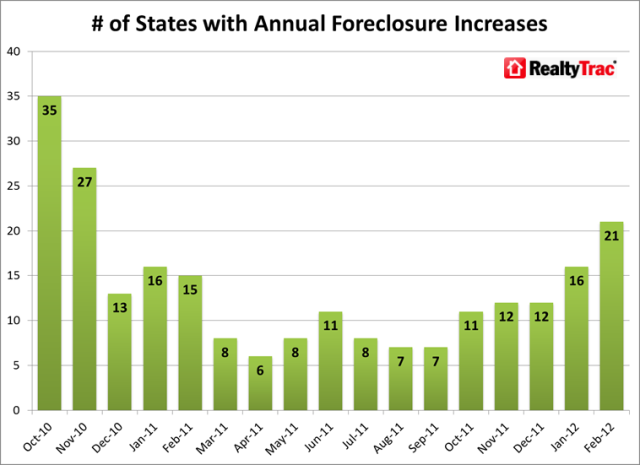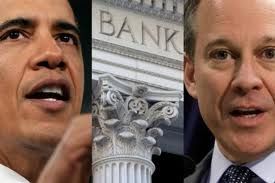The Foreclosure Fraud Settlement documents were filed in federal court and released to the public. There is a lot to wade through but the intrepid David Dayen at FDL News Desk breaks them down in a series of four articles that highlight just how easy these banks are getting off and what they are getting away with. Some of it will really make your blood boil:
Foreclosure Fraud Settlement Docs (I): Ally’s Side Deal
What accounts for this? Probably this little nugget buried in a Reuters article on the settlement:
Some banks negotiated separate requirements.
Ally Financial, for example, negotiated a steep discount on the fine part of its settlement, based on an inability to pay it, according to people familiar with the matter.
It was expected to pay some $250 million, but the Justice Department cut it to around $110 million, these people said.
In exchange, it committed to solicit all borrowers in its own loan portfolios and to offer to cut principal for delinquent borrowers down to 105 percent of the home’s value. It also offered to refinance underwater borrowers who are current on their payments.
Gee, I didn’t know that federal and state civil penalties had a “pay what you can” quality to them. [..]
About those state funds: there is nothing to stop state AGs from using them in any way they see fit. Note the weasel words in this language (which I’ve bolded):
Each State Attorney General shall designate the uses of the funds set forth in the attached Exhibit B-1. To the extent practicable, such funds shall be used for purposes intended to avoid preventable foreclosures, to ameliorate the effects of the foreclosure crisis, to enhance law enforcement efforts to prevent and prosecute financial fraud, or unfair or deceptive acts or practices and to compensate the States for costs resulting from the alleged unlawful conduct of the Defendants.
No more than ten percent of the aggregate amount paid to the State Parties under this paragraph 1(b) may be designated as a civil penalty, fine, or similar payment. The remainder of the payments is intended to remediate the harms to the States and their communities resulting from the alleged unlawful conduct of the Defendant and to facilitate the implementation of the Borrower Payment Fund and consumer relief.
You have that strong word “shall” competing with “to the extent practicable.” And indeed, several states have already made clear that they will be diverting much of the settlement into their state budgets. More make it clear in the settlement docs, more on that later.
Foreclosure Fraud Settlement Docs (II): Giving Homes to Charity as a Penalty
Another part of the document explains that any modification under any government housing program can qualify under the settlement credits:
Eligible modifications include any modification that is made on or after Servicer’s Start Date, including:
i. Write-offs made to allow for refinancing under the FHA Short Refinance Program;
ii. Modifications under the Making Home Affordable Program (including the Home Affordable Modification Program (“HAMP”) Tier 1 or Tier 2) or the Housing Finance Agency Hardest Hit Fund (“HFA Hardest Hit Fund”) (or any other federal program) where principal is forgiven, except to the extent that state or federal funds paid to Servicer in its capacity as an investor are the source of a Servicer’s credit claim.
iii. Modifications under other proprietary or other government modification programs, provided that such modifications meet the guidelines set forth herein.
Presumably those programs weren’t all going to shut down. So banks doing what they’ve been doing, meeting the minimum requirements of those other programs, will help them complete the settlement requirements.
Foreclosure Fraud Settlement Docs (III): “Internal Review Group”
Page E-3 details the “internal review group”:
Servicer will designate an internal quality control group that is independent from the line of business whose performance is being measured (the “Internal Review Group”) to perform compliance reviews each calendar quarter (“Quarter”) in accordance with the terms and conditions of the Work Plan (the “Compliance Reviews”) and satisfaction of the Consumer Relief Requirements after the (A) end of each calendar year (and, in the discretion of the Servicer, any Quarter) and (B) earlier of the Servicer assertion that it has satisfied its obligations thereunder and the third anniversary of the Start Date (the “Satisfaction Review”). For the purposes of this provision, a group that is independent from the line of business shall be one that does not perform operational work on mortgage servicing, and ultimately reports to a Chief Risk Officer, Chief Audit Executive, Chief Compliance Officer, or another employee or manager who has no direct operational responsibility for mortgage servicing.
So the bank can take their own employees out of another part of the bank and have them conduct a quarterly review, which then gets passed to the monitors and becomes the initial basis for enforcement. Even if you believe these will be “independent” internal reviews, we’ve seen with the OCC foreclosure reviews that those independent reviewers paid for and hired by the banks typically write bank-friendly reports. In fact, a later note indicates that “The Internal Review Group may include non-employee consultants or contractors working at Servicer’s direction.”
Foreclosure Fraud Settlement Docs (IV): Association of Mortgage Investors Planning to Challenge in Court
At any rate, if there’s one group who does not agree with HUD that investors won’t end up footing the bill for a substantial portion of the settlement, it’s… the Association of Mortgage Investors. The trade group representing investors in mortgage-backed securities fully believes they will be on the hook for losses, and so they will challenge the settlement in federal court.
As the federal court reviews the final settlement, AMI asks that the following changes be made on behalf of all investors:
Transparency. The NPV (net present value) model incorporated into the settlement must consider all of a borrower’s debts, be national in scope, transparent, and publicly disclosed; the NPV model must be developed by an independent third-party. An incorrect NPV model likely will lead to further re-defaults and further harm distressed homeowners.
Monetary Cap to Protect Public Institutions. As intended, the settlement causes financial loss to the abusers (the bank servicers and their affiliates). Unfortunately, the settlement is expected to also draw billions of dollars from those not a party to the settlement, including public institutions, unions, and individual investors. It places first and second lien priority in conflict with its original construct thereby increasing future homeowner mortgage credit costs. It is unfair to settle claims against the robosigners with other people’s funds. While we request that it not be done, at a minimum we request that a meaningful cap be placed on the dollar amount of the settlement satisfied by innocent parties. Again, restitution should come from those who are settling these claims, and
Public Reporting. We ask that the settlement Administrator be required to make reports public and available on a monthly basis, reporting progress on clearly defined benchmarks and detailing on both a dollar and percentage basis whether the mortgages modified are owned by the mortgage servicers or the general public.
Over at naked capitalism, Yves Smith points out The Legal Lie at the Heart of the $8.5 Billion Bank of America and Federal/State Mortgage Settlements
HUD Secretary Donovan, the propagandist in chief for the Federal/state mortgage pact, has claimed he has investor approval to do the mortgage modifications that are a significant portion of the value of the settlement. We’ll eventually see what is actually in the settlement, but the early PR was that “no less than $10 billion” of the $25 billion headline total was to come from principal reductions. Modifications of mortgages not owned by banks, meaning in securitized trusts, are counted only 50% and before Donovan realized he was committing a faux pas, he said he expected 85% of the mods to be from securitizations, so that means $17 billion. [..]
But what about this investor approval that Donovan says he has? He has told both journalists and mortgage investors directly that the bulk of the mods will come from Countrywide deals and he has consent via the $8.5 billion Bank of America/Bank of New York settlement. Huh? First, it seems more that a bit cheeky to rely on a major piece of a program via a deal that has not yet gone through (the Bank of America settlement was removed to Federal court and has now been sent back to state court, and there will be discovery in the state court process, so approval is not imminent).
But second and more important, investors approved nothing. Bank of New York is trying to act well outside its authority as trustee for the 530 Countrywide trusts in the settlement. It’s tantamount to having a friend that you gave a medical power of attorney claim that it gave him the authority to sell your car and write checks on your account.
The terms of Countrywide PSAs vary, but all appear to restrict mods. The prohibitions varied by credit quality of the deal. Alt-A and early vintage (2004 and earlier) deals often barred mods completely; subprime and later vintage deals generally allowed for a higher limit on mods, with 5% the top amount across these deals. The idea was that some mods were expected in the dreckier mortgage pools. Nevertheless, all of them, as well as the few that had no caps, also required Bank of America to buy the modified loans back at par. That is something the battered Charlotte bank would be very keen to avoid doing.
This comment by Synoia sums it all up pretty nicely:
The Banks won’t be held accountable
The Banks won’t fix their past behavior
The Banks won’t change their behavior
The Banks won’t stop bribing our politicians
The Banks won’t stop gouging consumers
The Banks won’t tell the truth about any facet of their business
The Banks won’t stop taking enormous risks with other people’s money
The Banks won’t stop paying their worthless executives too much money
Need one continue?
And this settlement won’t change a thing.
Thank you, President Obama




 I realize that there has been a lot of speculation about what went down in the 24 hrs prior to the SOTU after Miller announced that there was no bank/state settlement deal. There is a lot of speculation about Schneiderman and not without good reason. When I was writing
I realize that there has been a lot of speculation about what went down in the 24 hrs prior to the SOTU after Miller announced that there was no bank/state settlement deal. There is a lot of speculation about Schneiderman and not without good reason. When I was writing  While there are there are many reasons to cheer President Obama’s announcement during his State of the Union address that he was
While there are there are many reasons to cheer President Obama’s announcement during his State of the Union address that he was 
Recent Comments